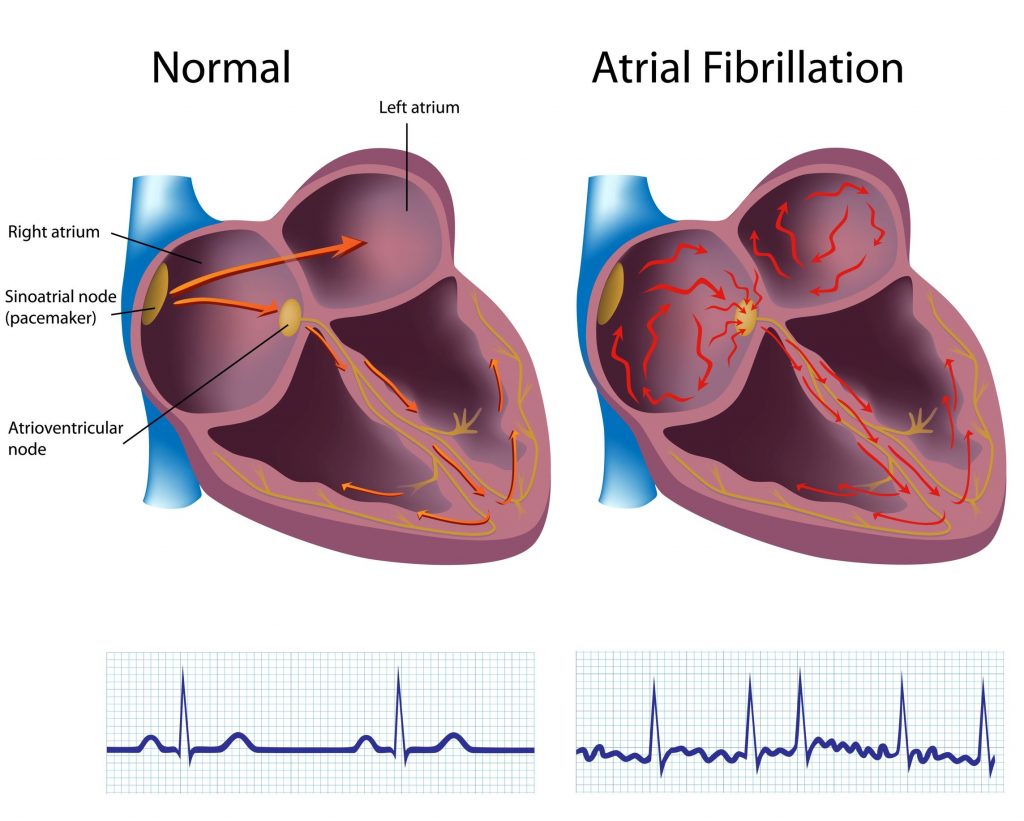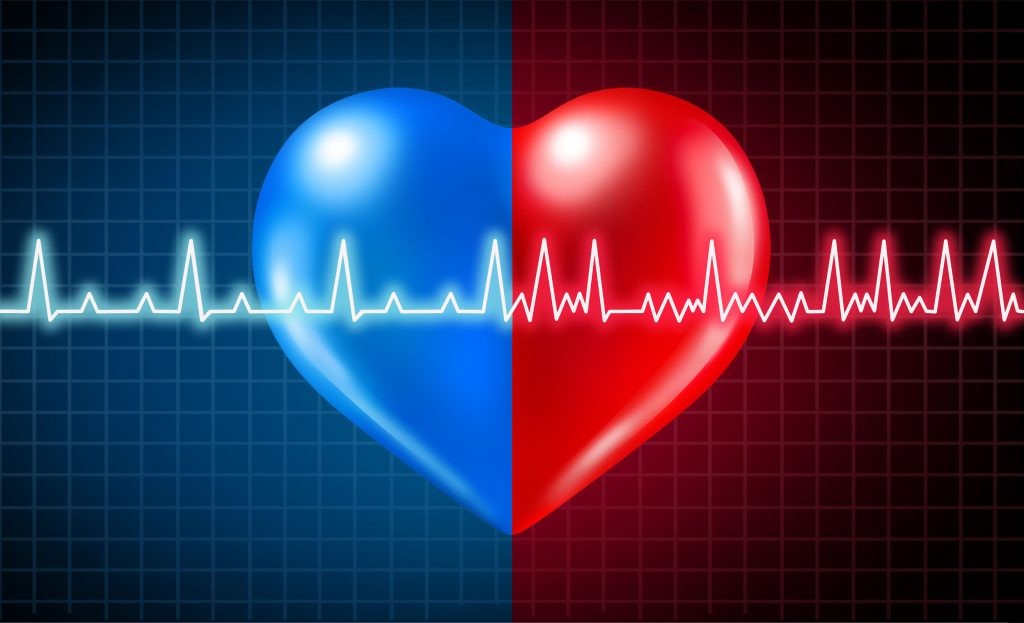What is Atrial Fibrillation? Symptoms, Causes, Triggers
Posted by Prescription Hope - See Editorial Guidelines (Last Updated On: Fri Apr 28 2023)
The CDC estimates that between 2.7 and 6.1 million Americans suffer from atrial fibrillation. But what is atrial fibrillation and who’s at risk for it?
In this article, we will explain what atrial fibrillation is and many other details surrounding this condition. First, here is a quick summary to get you started.
What is Atrial Fibrillation? Atrial fibrillation, often abbreviated AFib, occurs when the upper chambers of the heart do not coordinate with the lower chambers. This causes the heart to beat irregularly. The irregular heartbeat caused by AFib puts a person at risk for heart attack, stroke, other heart-related complications.
Now that you have a basic understanding, let’s get into more of the details.
Atrial Fibrillation Explained

Atrial fibrillation is defined as a quivering or irregular heartbeat. When a person has AFib, the upper chambers of their heart quiver. The quiver, or irregular beat, leads to inefficient blood flow through the ventricles.
An irregular heartbeat (arrhythmia) puts a person at risk for having a blood clot, heart attack, stroke, or other condition related to the heart.
Atrial fibrillation can affect people in various forms, which include occasional, persistent, long-standing persistent, and permanent.
Occasional, or paroxysmally AFib comes and goes in episodes that may last anywhere from a few minutes to hours. Symptoms for occasional atrial fibrillation often go away on their own, but patients may need treatment.
A patient with persistent atrial fibrillation will need to receive treatment. Their symptoms will not go away on their own.
Atrial fibrillation that lasts longer than a year is considered long-standing persistent AFib.
Permanent atrial fibrillation is when a patient’s heart rhythm cannot be restored back to normal. The permanent condition means you will have this form of AFib for life, but medications can be taken to control heart rate and to prevent clots.
Symptoms of AFib

A person with atrial fibrillation may say that it feels like their heart is banging the inside of their chest wall. It may feel like their heart is beating very rapidly while they are struggling to get a full breath of air.
The most noticeable symptom of atrial fibrillation is palpitations, which is the sensation of your heart skipping a beat. If you check the pulse of a person that is having heart palpitations, you may notice a rapid and pounding heartbeat.
Other symptoms of atrial fibrillation may include:
- Irregular heartbeat
- Weakness
- Lightheadedness
- Fatigue
- Dizziness
- Shortness of breath
- Chest pain
- Inability to exercise
If you have not been diagnosed with atrial fibrillation but are experiencing symptoms, you should see a doctor. If you are experiencing chest pain or other serious symptoms, then seek immediate medical attention, as this may be a sign of a heart attack.
Who is At Risk for Atrial Fibrillation?
In order for us to understand who is most at risk for atrial fibrillation, we first need to know what causes it. Atrial fibrillation is most notably caused by damage to the structure of the heart, as well as older age. Therefore, possible causes may include:
- Advancing in age
- High blood pressure
- Obesity
- Diabetes
- Heart attack
- Heart failure
- Congenital heart defects
- Overactive thyroid
- Overexposure to stimulants (smoking, alcohol, etc.)
- Lung disease
- Chronic kidney disease
- Viral infections
- Sleep apnea
- Sick sinus syndrome
Since these are the risk factors, individuals that have such conditions or fall under certain categories are at an increased risk of atrial fibrillation. The older a person is, the higher their chances are of developing AFib.
Anyone that has heart disease will be at an increased risk. This includes those with congestive heart failure, artery disease, heart valve problems, and those that have had a heart attack or heart surgery.
Chronic conditions, such as diabetes or thyroid problems, will also increase a person’s risk.
Can Atrial Fibrillation be Cured?
Atrial fibrillation can be treated through a cardiac or catheter ablation. An ablation is a procedure that either scars or destroys the tissues in the heart, causing an irregular heartbeat. Typically, an ablation consists of a small catheter that is inserted into a vein or artery in the groin area. The catheter is then threaded up to the heart, where it uses either heat or extreme cold to scar the tissues.
Other than having an ablation, there is no cure for atrial fibrillation. The condition can be “resolved,” but this does not mean it is cured. For example, a person that experiences an episode of atrial fibrillation but doesn’t experience any problems after that episode would have resolved atrial fibrillation.
A patient that is taking medication to keep atrial fibrillation under control will also have a resolved condition. However, AFib can come back, and the patient may still be at risk of having a stroke.
If you have resolved atrial fibrillation, then your doctor may still prescribe medications to limit your risk of having a stroke.
What can Trigger Atrial Fibrillation?
Atrial fibrillation may be triggered by certain situations or factors. These triggers may include:
- Binge drinking – drinking excessive alcohol
- Being overweight
- Consuming high amounts of caffeine – drinking coffee, tea, energy drinks
- Drugs – amphetamines, cocaine, etc.
- Medications – certain over-the-counter medicines and supplements
- Tobacco use
- Emotions – having strong emotions or being upset
- Fatigue – lacking sleep or having an illness
- Hormonal changes
- Dehydration
The triggers for atrial fibrillation may vary from person to person. You should know if you are at risk for atrial fibrillation and what triggers most affect you. Cutting these triggers out of your life can limit your risk for heart-related complications and potentially prevent atrial fibrillation.
How Long Can a Person Live with Atrial Fibrillation?
A person with AFib can live a long and satisfying life. If you keep your condition under control, then you can have a normal lifespan, even with atrial fibrillation.
The key is taking steps to ensure that your heart rate and overall condition is under control. If the patient’s condition is not well controlled, and they are not taking proper medications, their lifespan can be shortened.
It is important to note here that atrial fibrillation may be a sign of another underlying condition, particularly a heart condition. If this is the case, then the patient’s outlook may shift.
Conclusion
We hope this has given you a greater understanding of what atrial fibrillation is and everything else to know about the condition. For more advice, talk to your doctor.
If you are struggling to afford your medication, then Prescription Hope may be able to help. We work with pharmaceutical companies to provide individuals with the medicines they need at a set, affordable cost. Enroll with us and start saving money today!

